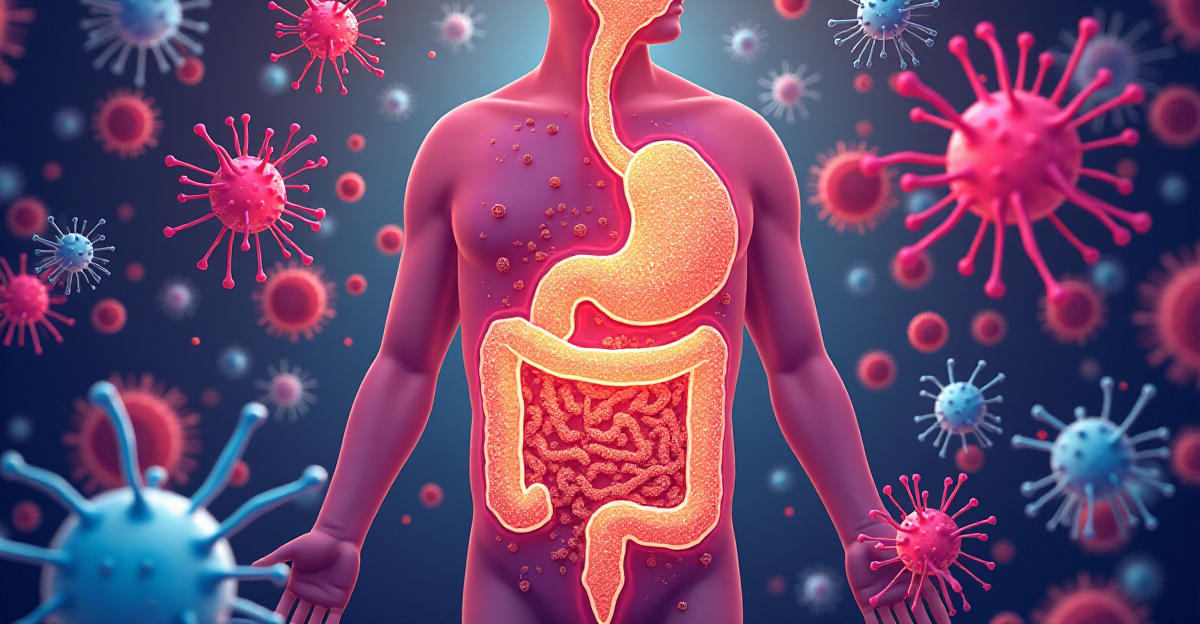New studies relate rheumatoid arthritis to the gut microbiota and propose microbiome changes could help forecast or prevent this condition. This paper explores how some gut-based bacteria are supposed to be involved in inflammation and autoimmune reactions. Talking about results in biology and immunology will highlight ways people could prevent problems and take action to help a balanced microbiome. Personal knowledge on dietary and health practices to maintain gut health will provide a relevant aspect.
Table of Contents
- The Link Between Gut Microbiome and Inflammation
- Research Findings on Microbiome Shifts and Arthritis
- Steps for Supporting a Balanced Microbiome for Autoimmune Health
- Extra’s:
The Link Between Gut Microbiome and Inflammation

With trillions of bacteria living within it—especially in the gut—the human body is a complex ecosystem. Maintaining general health depends much on this large community sometimes referred to as the gut microbiome. Emerging studies point to microbiome shifts, or imbalances in this microbial ecology, perhaps having a major influence on the onset of inflammatory disorders including rheumatoid arthritis. Examining how some gut bacteria can induce autoimmune reactions and how we might possibly reduce this risk, this article explores the amazing link between the gut microbiome and inflammation.
The Gut Microbiome’s Role in Inflammation
The gut microbiome actively interacts with our immune system, therefore influencing its development and operation rather than only a passive passenger. A strong immune system depends on a varied and in balance gut microbiome. When the microbial equilibrium is disturbed, though, some kinds of bacteria can set off inflammatory reactions. These inflammatory reactions help autoimmune disorders like rheumatoid arthritis to arise.
The synthesis of metabolites, small compounds capable of traversing the body and interacting with different cells and tissues, is one way the gut microbiome shapes inflammation. While some gut-produced compounds made by bacteria could aggravate inflammation, others have anti-inflammatory properties. An imbalance in the gut microbiome can boost the synthesis of pro-inflammatory chemicals, therefore aggravating chronic inflammation.
Through influencing the integrity of the gut barrier, the gut microbiome can potentially influence inflammation. A physical barrier, the gut lining keeps dangerous chemicals out of the bloodstream. But an imbalance in the gut microbiome can cause the gut barrier to leak, enabling bacteria and their products to enter the bloodstream. An immunological reaction brought on by this might cause inflammation all across the body. Typical signs of rheumatoid arthritis like joint pain and swelling might also show up as this inflammatory response.
Supporting a Balanced Microbiome for Health
Promoting general well-being and avoiding chronic inflammation depend on keeping a balanced gut microbiome. These techniques will help you in your daily life to support a good gut microbiome:
- Dietary Intervention: A diet rich in fiber, found in fruits, vegetables, and whole grains, provides essential nutrients for beneficial bacteria. Limiting processed foods, sugar, and unhealthy fats can help prevent the overgrowth of harmful bacteria.
- Probiotics and Prebiotics: Consuming probiotics, which are live bacteria that can benefit gut health, through fermented foods like yogurt or taking supplements, can help restore the balance of the gut microbiome. Prebiotics, which are non-digestible fibers that feed beneficial bacteria, can also be incorporated into the diet through foods like asparagus, onions, and garlic.
- Stress Management: Stress can significantly impact the gut microbiome. Engaging in relaxation techniques like yoga, meditation, or spending time in nature can help regulate stress levels and support gut health.
- Sleep: Getting enough quality sleep is essential for maintaining a healthy gut microbiome. Aim for 7-8 hours of sleep per night.
- Exercise: Regular physical activity can help improve gut health by promoting blood flow and stimulating the immune system.
Knowing the complex relationship between the gut microbiome and inflammation can help us to maintain our health holistically. Powerful ways to keep a balanced gut microbiome are changing your diet, controlling stress, and sleeping sufficiently. See a healthcare provider if your gut microbiome worries you.
Research Findings on Microbiome Shifts and Arthritis

Ever given the trillions of bacteria residing in your gut any thought? Known as the gut microbiome, this intricate ecology is absolutely vital for your general health and affects everything including digestion and immunity. Recent studies, however, point to imbalances in the gut microbiome, sometimes known as microbiome shifts, as perhaps related to the onset of inflammatory diseases such as rheumatoid arthritis.
Understanding the Connection Between Microbial Imbalances and Immune Function
A good gut microbiome strengthens immune system. Disturbances in its balance, however, can cause some bacteria that generate inflammatory chemicals to proliferate excessively. These chemicals pass into the bloodstream and might cause chronic inflammation as well as perhaps rheumatoid arthritis.
Furthermore, microbiome shifts are thought to compromise the gut barrier, which serves as a protective shield keeping dangerous chemicals out of the bloodstream. But changes in the gut microbiome can compromise this barrier and increase permeability. This leaky gut lets germs and their waste into the circulation, which sets off an immunological reaction and fuels general inflammation. The hallmark signs of rheumatoid arthritis, this inflammation might show up as joint pain and swelling.
Strategies for Maintaining a Balanced Gut Microbiome
Although studies between microbiome shifts and rheumatoid arthritis are still under progress, there is mounting evidence indicating a balanced gut microbiome is good for general health, particularly for your immune system.
Let us explore some techniques to foster a good gut:
- Dietary Interventions: A diet rich in fiber from fruits, vegetables, and whole grains is essential for nourishing beneficial bacteria in your gut. Limiting processed foods, sugar, and unhealthy fats can help prevent the overgrowth of harmful bacteria. Here are some fiber-rich foods to incorporate into your diet:
- Fruits: Apples, bananas, berries, pears, oranges, and grapefruit.
- Vegetables: Broccoli, Brussels sprouts, carrots, peas, spinach, and sweet potatoes.
- Whole grains: Brown rice, quinoa, oats, barley, and whole-wheat bread.
- Probiotics and Prebiotics: Probiotics, live bacteria that benefit gut health, can be found in fermented foods like yogurt or taken as supplements. Prebiotics, non-digestible fibers that feed beneficial bacteria, can be incorporated through foods like asparagus, onions, and garlic. Try incorporating fermented foods like sauerkraut, kimchi, and kombucha into your diet.
- Stress Management: Chronic stress can disrupt the balance of the gut microbiome. Techniques like yoga, meditation, or spending time in nature can help regulate stress levels, ultimately promoting gut health.
- Sleep: Getting enough quality sleep is crucial for maintaining a healthy gut microbiome. Aim for 7-8 hours of sleep per night.
- Exercise: Regular physical activity can improve gut health by promoting blood flow and stimulating the immune system.
Maintaining a balanced gut microbiome might lower the incidence of allergies, digestive issues, and potentially some malignancies. See a healthcare provider for individualized guidance and assistance if you worry about your immune system or gastrointestinal health.
Steps for Supporting a Balanced Microbiome for Autoimmune Health

Consider your gut as a busy metropolis full with billions of microscopic inhabitants including bacteria, yeasts, and other microbes. Our general health depends critically on the intricate ecology formed by these bacteria, sometimes known as the gut microbiome. A good gut microbiome supports immune system strength, digestion, and even mental wellness. But a balanced gut supports a strong immune system and helps to prevent chronic inflammation, not only about how one feels. Studies point to variations in the gut microbiome as possibly related to the emergence of autoimmune diseases including rheumatoid arthritis. Here, the idea of a balanced microbiome becomes absolutely vital, particularly for those worried about autoimmune health. Would you desire knowledge on easy actions you might do to help to maintain a good gut flora?
We will discuss some doable tactics you can use to foster a good gut environment and maybe reduce your chance of autoimmune illnesses.
Practical Strategies to Nurture a Thriving Gut
Particularly given the possible link between gut microbiome changes and autoimmune diseases, a healthy gut microbiome is absolutely necessary for disease prevention and general well-being. Research on the gut microbiota, for instance, points to possible rheumatoid arthritis development contributing factor. An autoimmune condition mostly affecting the joints, rheumatoid arthritis causes pain, swelling, and stiffness. Studies show that in those with rheumatoid arthritis, some gut bacteria could set off an immune reaction that causes inflammation and joint destruction.
Dietary Intervention:
- Embrace Fiber-Rich Foods: Picture your good gut bacteria as tiny workers who need plenty of food to function. A diet rich in fiber, found in fruits, vegetables, and whole grains, is like providing your gut with delicious fuel.
- Limit Processed Foods: Processed foods with lots of sugar, unhealthy fats, and artificial ingredients can throw off the balance of your gut bacteria, creating a less hospitable environment. Instead, focus on eating whole, unprocessed options.
- Hydration: Just like a city needs water, our gut needs plenty of hydration to function properly. Make sure to drink plenty of water throughout the day.
Probiotics and Prebiotics:
- Incorporate Fermented Foods: Fermented foods like yogurt, kimchi, sauerkraut, and kombucha are packed with probiotics, live bacteria that help maintain a balanced gut. Think of these foods as delivering friendly neighbors to your gut community.
- Explore Prebiotics: Prebiotics are like fuel for your good gut bacteria. Foods like asparagus, onions, garlic, and bananas contain these special fibers that help your gut flora thrive.
Beyond Diet:
- Manage Stress: Stress can create a chaotic environment for your gut. Practice stress-reducing techniques like yoga, meditation, deep breathing exercises, or spending time in nature to help regulate your stress levels.
- Prioritize Sleep: Think of sleep as giving your gut city a chance to rebuild and repair itself. Aim for 7-8 hours of quality sleep each night to support a healthy gut microbiome.
- Stay Active: Regular physical activity improves blood flow and stimulates your immune system, which directly benefits your gut health. Engage in activities you enjoy, whether it’s brisk walking, swimming, or dancing.
These techniques help you to promote your general health and foster a balanced gut flora. Recall that a happy gut helps you to be happier too! See a healthcare expert if you are looking for individualized advice or have questions regarding your digestive condition.
Looking to start down the road towards a better gut? First, start including more foods high in fibers into your diet. Your gut flora will be getting the nutrients they need to flourish thanks you!
Extra’s:
For those interested in the broader impact of scientific exploration, our post “Space Exploration’s Impact on Science Education: Inspiring the Next Generation” explores how space missions inspire young minds and shape the future of science education. Alternatively, if you are fascinated by the environmental implications of microplastics, you might find “How Microplastics in the Atmosphere Could Change Our Weather” insightful. It delves into the potential influence of microplastics on our climate and weather patterns.
To further understand the complex relationship between the gut microbiome and rheumatoid arthritis, “How does an imbalanced gut impact rheumatoid arthritis?” provides a comprehensive overview of the role of gut bacteria in the development of the disease. Additionally, “Probiotic Supplementation for Rheumatoid Arthritis: A Promising Adjuvant Therapy in the Gut Microbiome Era – PMC” offers scientific insights into the potential benefits of probiotic supplementation as an adjuvant therapy for rheumatoid arthritis.












1 thought on “Gut Microbiome Changes and Their Role in Rheumatoid Arthritis Prevention”